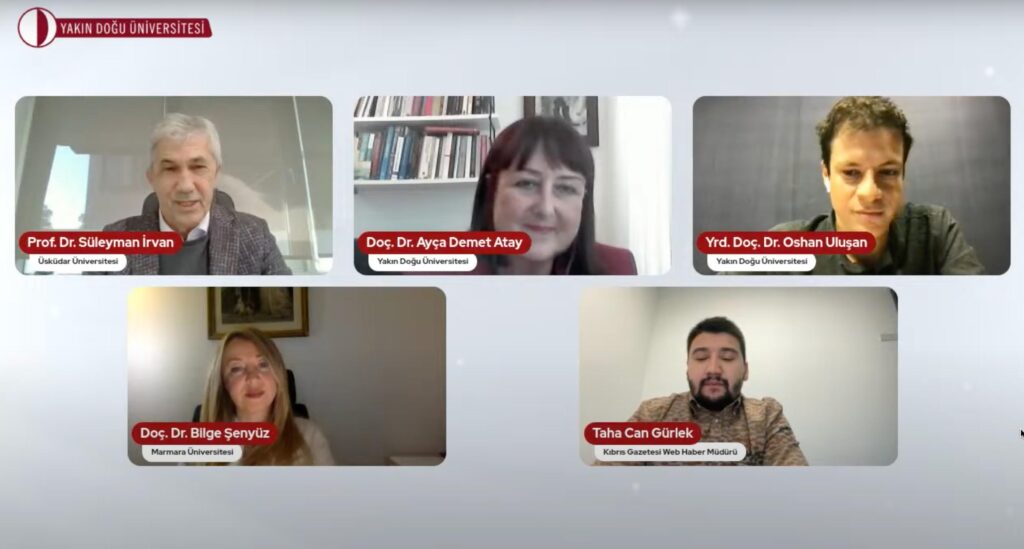
The Near East University, Faculty of Communication, Journalism Department held a panel titled “Using Artificial Intelligence in Journalism: Possibilities and Risks” through which the impact of artificial intelligence on the media sector was discussed.
Note: The photo of this news was produced with artificial intelligence!
The Near East University, Faculty of Communication, Journalism Department held a panel titled “Using Artificial Intelligence in Journalism: Possibilities and Risks” through which the impact of artificial intelligence on journalism was discussed. The online panel was moderated by Assoc. Prof. Dr. Ayça Demet Atay, Head of the Near East University, Journalism Department, and Assoc. Prof. Dr. Oshan Uluşan, Faculty Member of the Near East University, Journalism Department.
The role of artificial intelligence in news production processes and ethical issues such as accuracy, transparency and impartiality were discussed in the panel hosted by Prof. Dr. Süleyman İrvan, Head of the Üsküdar University, Journalism Department, Assoc. Prof. Dr. Bilge Şenyüz and Kıbrıs Newspaper Web News Manager Taha Can Gürlek took part as the speaker.
At the panel where important assessments were made on the future of artificial intelligence technology in the media sector, how this technology can be used more efficiently and reliably in news production was discussed, and possible ethical risks and the precautions to be taken against these risks were also assessed.

Effects, opportunities and ethical dimensions of Artificial Intelligence in journalism
Taha Can Gürlek, who was the first speaker of the panel, explained how they use artificial intelligence in Kıbrıs Newspaper. Stating that they use ‘ChatGPT’ and Word’s ‘Dikte’ program in news production processes in particular, Gürlek said that they actively use artificial intelligence in big data analysis and graphing of data. He also stated that they benefit from artificial intelligence technology in the stage of verifying the accuracy of videos used in news. However, Gürlek, who also emphasized the negative effects of artificial intelligence on journalism, said, “We have lost the human touch in the news. Artificial intelligence will kill 80 percent of the profession.”
Referring to the areas where artificial intelligence is used in journalism, Assoc. Prof. Dr. Bilge Şenyüz stated that this technology is a highly efficient tool in various areas such as creating news ideas, preparing event agendas, translating, writing scripts, producing title suggestions, preparing templates for news types and summarizing voluminous data. Drawing attention to the importance of giving the right commands in the use of artificial intelligence, Assoc. Prof. Dr. Bilge Şenyüz made the following recommendations: “Frame the questions clearly and number them if you have more than one question.”
Another speaker of the panel, Prof. Dr. Süleyman İrvan, focused on the ethical dimensions of the use of artificial intelligence in journalism. Referring to the ethical principles declaration on the use of artificial intelligence prepared by the ‘Reporters Without Borders’, Prof. Dr. Süleyman İrvan said, “Although artificial intelligence-focused journalism is economically more cost-effective, the news should always prioritize people.” In addition, Prof. Dr. Süleyman İrvan said, “Just as there is a distinction between news and commentary, there should be a similar distinction between original and artificial intelligence content.”